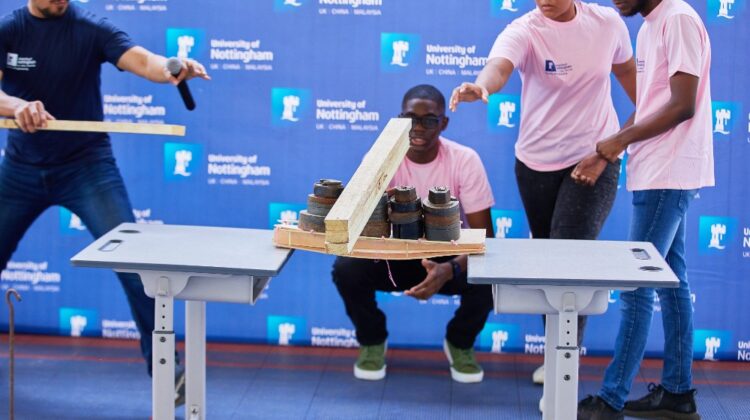
The University of Nottingham’s Faculty of Engineering has continued its commitment to inspiring future engineers and architects across the globe by collaborating with students in Ghana for the first time.
The International Engineering Competition for Schools in Ghana, which was hosted by the Ghana International School, brought together eight schools for a practical bridge-building challenge. Ahead of the event, the competing schools attended two webinars on structures and bridges that were delivered by Luis Neves, associate professor and international civil engineering expert at the university.
Using the theory they learned – and limited materials, including plywood, wood strips, glue and thread – the participants had to design a model bridge that would cross a 50-centimetre gap before they were put to the test. Each bridge was also weighed to see how much material had been used to add a sustainability angle – something that’s at the heart of courses at the university.
The aim of the competition was to broaden young people’s understanding of STEM subjects and engage the next generation of industry leaders. ‘Our commitment towards engineering and architecture education goes beyond the physical boundaries of the University of Nottingham, and beyond the age group that people might associate with a university student,’ said Mohamed Elmaghrbi, director of student recruitment in the Faculty of Engineering. ‘The Ghana Engineering competition was our first of its kind and is a step forward in building international collaborations with partners to help deliver exciting architectural and engineering outreach programmes to help educate the students of the future.’
The entries were judged on a range of criteria, including the ratio of the weight the bridge could carry to the weight of the bridge itself. The winner was Dayspring International Academy, whose students were commended for their design, which enabled their bridge to withstand the greatest weight and boast the highest weight to material ratio. Aburi Girls and Association International School came in second and third respectively.
‘We have come back from Ghana with more energy and ideas than what we had when we set off, which in itself tells us that, for us to be able to face the global engineering, environmental and scientific challenges, we need minds and brains from all over the world to work together collaboratively,’ Elmaghrbi said.


